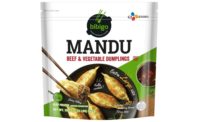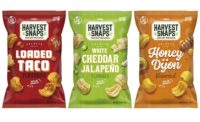Food waste constitutes a huge, multi-layered problem around the globe. According to ReFED, an organization dedicated to combating the problem, in the U.S. alone, a whopping 33% of the overall food supply (about 80 million tons) is lost to landfills, incinerators, and crops left to rot in the field before they are harvested.
Producers like Confetti Snacks are seeking to reduce the issue of food waste by diverting items that might go down the train and instead using them as ingredients in tasty, healthful snacks. Snack Food & Wholesale Bakery recently connected with Confetti Snacks Founder Betty Lu (just in time for the June 24 Upcycling Day occasion) to learn more about the impact of global food waste, the upcycling food trend, and the story behind the company’s mission.
Jenni Spinner: Could you please tell us what upcycled food is, and how that trend has evolved in recent years?
Betty Lu: Upcycled foods are foods that are made from ingredients that would otherwise have been discarded due to reasons such as unattractive appearance, crop surpluses, and food by-products. Despite being considered waste, these ingredients are often still perfectly safe to consume. Upcycling these ingredients into new food products is a way to reduce waste and create value from what would have otherwise ended up in the landfills.
The upcycling food trend has evolved over the years. What started out simply as a means to make use of leftovers or scraps has today, evolved into a more comprehensive movement. From Michelin restaurants down to the average household, huge corporations and individual consumers alike are challenging themselves to transform this ugly produce into other forms of delicious and innovative delectables.
With 12% of human-caused greenhouse gases being attributed to food waste, upcycling food is a great way to reduce food waste, conserve resources, and be more sustainable.
JS: What’s Upcycling Day all about?
BL: Upcycling Day is celebrated annually on June 24. It is an international event that celebrates the creative process of transforming discarded materials into new materials, products of higher quality and better value. People can participate in this event by attending an upcycling workshop organized by their local community. In addition to the environmental benefits, upcycling can also be a way to save money, be more creative, and pick up new skills.
JS: Please talk about some of the benefits of upcycled foods—to producers, consumers, and other stakeholders.
BL: Upcycling helps producers to reduce food waste by turning surplus produce and other food waste into new and innovative products. This helps producers to save money on disposal costs and help them to meet sustainability goals. When producers sell their crop surpluses and imperfect produce to upcycling food businesses, it creates a new revenue stream for them. In addition to the economic benefits, upcycling can also improve a producer's brand image. By positioning themselves as a sustainable and environmentally conscious company, producers can potentially attract new customers and further boost sales.
Upcycled foods are a more sustainable choice for consumers than traditional foods. When consumers buy into these upcycled foods, they often experience a “feel good” effect because they know they are consciously reducing their carbon footprint and contributing to a sustainable mission. This feeling of satisfaction can further motivate consumers to continue choosing upcycled foods, which helps to create a more sustainable food system.
Upcycling reduces the environmental impact of food production by reducing food waste. This conserves natural resources, reduces greenhouse gas emissions, and protects the environment. Additionally, upcycling can also provide support for local economies by creating jobs and opportunities for businesses in the upcycled and food waste sector.
JS: Then, please tell us about Confetti Snacks’ story: how the company got started, who the key people with the company are, and how it’s grown since its founding.
BL: While on an epic 3.5-year round-the-world trip across 40+ countries, I experienced how different world cultures, landscapes and culinary heritage factors come together to influence the craft of food. In one such hiking trip up the lush mountains of British Columbia in Canada, I (an avid hiker), bored of snacking on the same greasy and unhealthy bags of white potato chips, landed on a “eureka” moment.
My experiences taught me that food is more than just sustenance; it is a way to connect with people, celebrate traditions, and appreciate the beauty of the natural world. While I wanted snacks to reflect this same sense of wonder and discovery, I also witnessed first-hand the health and sustainability issues that plague the world. I set out with a mission to be different—to craft tasty and healthier snacks made from rescued vegetables and place Singapore’s global flavors confidently on the world (snack) map. After hundreds of experimentation and feedback rounds, the perfect better-for-you, better-for-the-planet snack was finally born in 2018.
Our team of Confetti Yetis comprise:
- Betty Lu (me): founder and CEO, holds a Bachelor of Business (Marketing), and Minor in Entrepreneurship from Nanyang Technological University in Singapore. I’m a branding expert with a global strategic outlook, with a former Branding and Marketing role at SGX listed Healthway Medical Group.
- Michael Kravit: creative director, and former director of Honest Tea. Michael’s expertise spans across deep visual design strategy and development for packaging, retail artwork development and execution, video advertising, innovation, digital marketing campaigns and field activation. To date, he has developed over 60 new packaging items.
- Alexander de Wit: chairman, with early involvement in other better-for-you, better-for-the-planet brands like Oatly and Vitamin Water.
Confetti’s top leaders are supported by a dynamic and ever-growing young team of Yetis based in Singapore and the U.S.
Over the years, Confetti has collected numerous prestigious awards under her belt. These include:
- The ‘Michelin Guide’ feature: the first-and-only in the vegetable and fruit chips category
- ‘5th Annual Singapore Business Awards’
- ‘Best Gourmet Snack’ by APAC Insiders (2021)
- ‘Tasty Singapore Brand Ambassador’ (2019 - 2022)
To date, Confetti has grown to more than 2,000 locations across the U.S. and Singapore. Confetti's products are now available in major supermarket chains, specialty stores, convenience stores, hotels, and gas stations. Confetti also supplies corporate pantries, including those of Singapore-based Temasek, Google, UPS, and most recently, to Zuckerberg's charity event in Chicago in May 2023. Confetti has also been featured in major international publications, such as the prestigious Food and Wine Magazine.
JS: Specifically, what makes Confetti Snacks unique in the snacks landscape?
BL: 95% of today’s snack market is dominated by nutritionally bankrupt, white foods like deep-fried potato chips and extruded corn puffs. Confetti disrupts this space by offering whole real vegetables and fruits—carrots, okras, radishes, beets, shiitake mushrooms, and mandarins—gently baked into the perfect, crunchy, colorful, and nutrient-dense snack.
Confetti’s snacks are made with carefully selected ingredients that are low in starch and calories, but high in vitamins and minerals. Confetti's vegetable chips are lab-proven to be one of the most nutrient-dense snacks on the market, with seven vegetable servings per packet. The mushroom chips are also excellent sources of calcium, magnesium, zinc, and vitamin B. All essential nutrients are naturally occurring, with no additional fortification — just the way Mother Nature intended. Fun fact: less than 12% of the US population consumes their recommended daily intake of fruits and vegetables.
Confetti is a forward-thinking brand that believes in the power of color and flavor. As such, we do not produce conventional flavors like original or sea salt. Instead, we offer only the most colorful, exciting, and adventurous flavors, inspired by the diverse culinary heritage of the world. We believe that people should indulge in the colors of the rainbow and experience the magic of each vegetable of the plant kingdom in its full glory.
Confetti is a purpose-driven brand that reduces food waste by upcycling imperfect produce and crop surpluses. We also work with multiple charitable organizations, such as UNICEF and the Red Cross, to donate a portion of our proceeds to alleviate global hunger and malnutrition.
JS: Please tell us about your current product and flavor offerings.
BL: Confetti takes pride in crafting award-winning gourmet vegetable, mushroom and fruit chips dressed in exotic and adventurous flavours from around the world. Our current products run across three lines and in five iconic flavors:
- Vegetable Chips: Teriyaki BBQ (Japanese-inspired), Summer Truffle (European-inspired), Tandoori Curry (Indian-inspired)
- Mushroom Chips: Green Curry (Thailand-inspired), Black Truffle (European-inspired)
- Mandarin Oranges: Original Just Half Moons
Confetti’s snacks are gluten-free, vegan, non-GMO and halal-certified.
JS: Anything planned for the future you can tell us about?
BL: We have many exciting plans in the works. In response to the success of our current snacks, we are planning to launch value-sized packs of our snacks next. We are also in discussions with Dole, the largest food producer in the world, to explore how we can turn their food surpluses into award-winning, colourful plant-based dips.
In addition, we are in talks with movie theatres and concert venues to become an official partner. We are also thrilled to be featured on Dennis Quaid’s Emmy award-winning documentary, The Next Great American Snack, which will be airing to 80 million American households this summer.
Finally, we are very fortunate to be collaborating with Disney and have the most famous mouse in the world share the fun and joy of Confetti’s magical snacking adventure—keep your eyes peeled for that.





.png?height=200&t=1669229841&width=200)